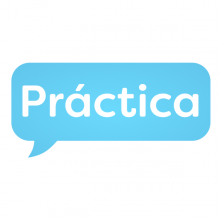1.B Subject Pronouns and present ser
SUBJECT PRONOUNS
They are the subject that carries out the verb in a sentence.
In Spanish, you can omit the subject pronouns because the conjugation of the verb implies who is the subject. You can use the pronoun to add emphasis.
First person
| Singular | Plural |
| I- Yo | We- Nosotros / Nosotras |
Second person
| Singular | Plural |
| You (Informal) – Tú | You all- Vosotros / Vosotras (Used in Spain/ not in Latin America) |
Vos- is used in Argentina instead of tú and has a completely different conjugation form.
Third person
| Singular | Plural |
| Him/her- él/ella | They- Ellos/ Ellas |
| You (formal)- Usted | You all- Ustedes (Used in most Latin American countries) |
Masculine and Feminine
Some pronouns have masculine and feminine forms. You can identify them with the ending “o” for masculine and “a” for feminine (except for “él”).
Nosotros and nosotras
Vosotros and vosotras
Ellos and ellas
Él and Ella
When the group includes only males, you will use the masculine endings.
If the group includes only females, you will use the feminine endings.
When the group is mixed, you will use masculine endings.
Usted and Tú
¨¨´`¨´´The use of you (tú and used) and used varies culturally between different Spanish speaking countries.
For example: In Costa Rica, people only use usted.
Practice here.
Present verb Ser
Ser and Estar both mean “to be” in English, but both are used differently depending on what the speaker intends to address. Below you will find the different uses of each.
Verb SER (to be)
| Singular | Plural |
| Yo- Soy | Nosotros/as- Somos |
| Tú- Eres | Vosotros/as- Sois |
| Él/Ella/Usted- Es | Ellos/Ellas/Ustedes- Son |
Uses:
Nationality or place of origin- Yo soy de México
Profession or occupation- Christian es médico
Characteristic of people or things- José y Laura son antipáticos
Generalizations- Las matemáticas son difíciles
Possessions- Bruno es el juguete de Julia.
What something is made out of- La pluma es de plástico
Time and date- Son las cinco de la mañana
Where or when an event takes place- La clase de español es al mediodía


